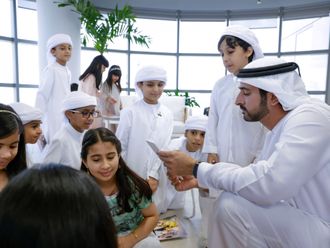Abu Dhabi: The country’s first Child Rights law, passed in January last year, was returned to the Federal National Council (FNC) with reservations from President His Highness Shaikh Khalifa Bin Zayed Al Nahyan on wording of an article of the law.
The wording of article 20 of the draft law, which creates a nationwide system to protect children from mistreatment, was edited and the draft was returned to the council for approval.
The committee on Health, Labour and Social Affairs, led by Mohammad Ahmad Al Yamahi, agreed to the changes and submitted the bill to the council.
The draft law to be taken up for discussion today and once it is approved by the FNC, signed into a law by Shaikh Khalifa and published in the Official Gazette, it will be enforced three months later.
The law would apply to all children up to 18 years, regardless of nationality and religion.
The draft law provides for children’s right to security, to freedom from inhuman, cruel, or degrading treatment and the right to special protection during childhood. It also states a child’s right to life, the right to a name, the right to express their views freely, the right to health care, the right to protection from economic and sexual exploitation, and the right to education.
The bill says every child, regardless of origin, nationality, religion or social status, has the right to a secure life, permanent care and emotional and psychological stability.
Last year, Mariam Al Roumi, Minister of Social Affairs, told the council, the law provides for seven basic rights, including the right of empowerment and the right to protection in keeping with the Convention on the Rights of the Child, to which the UAE became a signatory in 1996.
The new draft law covers all aspects related to children’s rights and contains instruments that ensure its implementation, as well as punishments that will punish people whose morals and religious beliefs do not stop them from violating the rights of children. The government also underlined its commitment to meet those basic needs and rights in the best ways.
Dr Amal Al Qubaisi, Speaker of the FNC, earlier asked that the draft law protect the best interests of children, and the request was endorsed by the council.
The best interests of the child shall be a primary consideration and the child shall be registered immediately after birth and shall have the right from birth to a name and the right to know and be cared for by his or her parents, according to the law.
Under the legislation, children have the right to protection from abuse, neglect, exploitation and discrimination. It also provides, among other rights, for economic, social and cultural rights, related to the conditions necessary to meet basic human needs such as food, shelter, education and health care.
Children also have the right to grow up and to develop physically and spiritually in a healthy and normal way, free and with dignity.
The UAE recently become the first Middle Eastern country to sign up to recommendations to combat the spread of online material depicting child sexual abuse, made by the Virtual Global Taskforce in its meeting last month in New Zealand.
Under the law, children have the right to be protected against cruel acts or exploitation and they shall not be obliged to do work which hinders their development both physically and mentally. They also have the right to be among the first to get help.
The bill allows childcare specialists to remove children from their homes against parents’ wishes and without judicial permission in cases of imminent danger.
After the child is removed from the home, the childcare specialist must obtain permission from the court within 24 hours.
In less severe cases, specialists may intervene by visiting regularly, providing social services and mediating a solution between the family and the child.
If the family refuses the solution or does not respond within 14 days, the case will then be referred to higher authorities.
Those who obstruct the work of a childcare specialist are subject to a fine between Dh5,000 and Dh50,000.
The FNC also removed most references to religion in the law to escape any possible implications to Muslims and non-Muslims.
The draft also stipulates that any offender who finishes a prison sentence would be prohibited from living within five square kilometres of the victim’s home.
In all cases, offenders will not be released from prison until they go through psychological tests to ensure they are not a threat to society.
Before parents are given custody of a child, they will have to prove themselves of sound mind.
Those who endanger the lives of children, abandon them, neglect them, leave them without supervision, do not enrol them in school or register them upon their birth, will face a prison term or a fine of not less than Dh5,000, according to the draft law
Those who publish child pornography on the internet will face a prison term of not less than six months.












